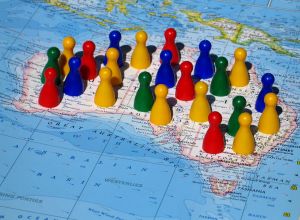Vibrant regional economies, more jobs for Australians in remote areas, better education and more enterprises for Aboriginal people are the goals of a new national research organisation.
In particular CRC-REP will directly address the Australian Government’s national priorities under its ‘Closing The Gap’ policy which aims to halve the unemployment, welfare and other differentials between Aboriginal people in remote areas and the rest of Australia.
“CRC-REP will follow from the successes of the Desert Knowledge CRC and is the most comprehensive approach to the issue of economic isolation yet developed,” the Managing Director of the Desert Knowledge CRC, Jan Ferguson said.
The new centre has three main goals:
- To develop new ways to strengthen regional economies across remote Australia
- To build new enterprises to provide jobs and livelihoods in remote areas
- To improve the education and training pathways for people living in remote areas.
In one of the nation’s largest single research partnerships, CRC-REP has more than sixty partners from Aboriginal organisations, non-government bodies, research agencies, universities, Australian and State governments and the private sector – including mining and pastoralism.
“The remote regions of Australia generate far more export income per head and have more businesses per head than the rest of Australia. We want these positive outcomes for the economy as a way to support the remote community’s economic activity,” Ferguson said.
“Australia relies on its remote regions for wealth and employment in our cities – but the remote regions often confront issues when it comes to access to markets, opportunities and access to services like education, health, housing and social welfare.
“The sheer breadth of support for this CRC from Federal and State government agencies as well as large, medium and small enterprises, Aboriginal communities, NGOs and some of the country’s top research bodies tells you how important and urgent this issue is now seen to be.
“There has never been a consensus quite like this, nor such an opportunity to harmonise the national effort to build the remote economy, across an area which embraces three quarters of our continent.
“Such a huge alliance can really only be achieved through the cooperative research centre model, which enables all these widely differing entities to work closely together for the same ends.”
The CRC-REP will be a “public good” research organisation delivering better business models and tools to remote populations. Over 15 years it aims to help achieve:
- 2,295 more direct jobs for Aboriginal people, especially in the art world
- Savings in welfare payments of $160 million
- Increased profitability in remote pastoral industry of $292 million
- Improved educational and health standards of residents in remote region
- Increased health and wellbeing in remote communities due to regular livelihoods.
“A very high priority will be working with Aboriginal communities to build new enterprises based around their cultural and natural resources – enterprises that will generate real and sustainable livelihoods for people living in remote settlements”, Ferguson said.
Based on successful models developed by Aboriginal people and communities, CRC-REP will assist in the development of new enterprises based around bush foods and medicines, culture, land management, art and tourism.
It will work with the mining industry and local government to ensure enduring benefits to surrounding regions and communities during mining operations and after they cease.
It will continue to develop ‘precision pastoralism’ technologies and systems as a sustainable industry for inland Australia pioneered by the Desert Knowledge CRC.
It will help develop sustainable energy solutions for remote areas and the nation as a whole, based on renewable resources and other opportunities, and assist remote populations to adapt to climate change.
“Especially we will explore innovative ways to deliver education in remote areas, adapting it better to local needs, making better use of technology and finding ways to attract and retain quality teachers in remote communities,” Ferguson said.
“Remote Australia may only account for 5 per cent of the population, but it covers more than three quarters of the continent and it deserves a sound scientific base and innovation.
“The CRC-REP is designed to build the economic strength, independence, skills and opportunities remote Australia requires to make its fullest contribution to the sustainability and economic prosperity of the nation.”















































































































































